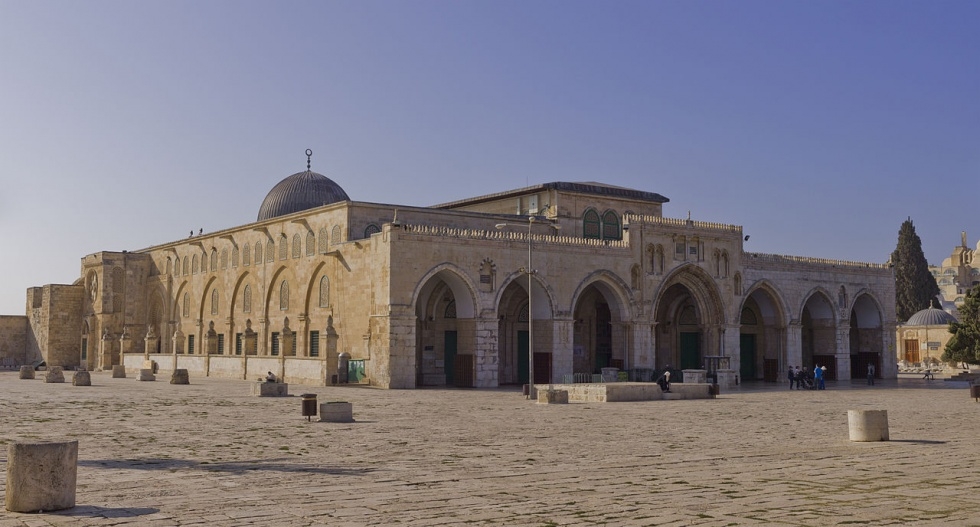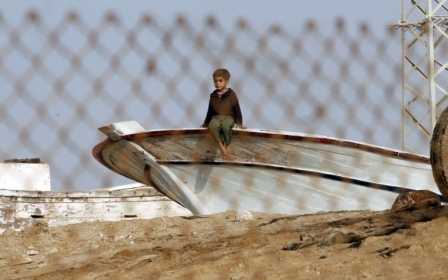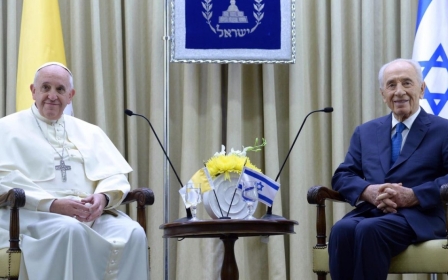Welcome to the Holy Land - and enjoy 27 hours in Israeli custody

“Do you know who we are and what we do in this room?” asked the pasty Israeli man sitting across the desk from me. “Israeli airport security?” I replied. “No” he said with a smirk, “we’re part of the Israeli security services team that investigates terrorism and threats to Israel’s national security.”
That was as much information as I was ever given about the men who interrogated me shortly after I arrived at Ben Gurion Airport in Tel Aviv where I had arrived for a few days holiday.
“The best-case scenario for you right now is that I deport you. The worst case is that I charge you with terrorist activities,” said the man in a self-satisfied manner.
“You think I’m a terrorist?” I asked incredulously? “You could be,” he retorted.
As a Muslim woman wearing a hijab I had expected airport security to be tight when arriving in Tel Aviv from the UK, but I had made the journey a few years back and had got in with no problem, so thought I would try again. I had a few days off work and decided another visit to the Holy Land was well overdue.
Within a few minutes of arriving at the airport I was told to wait in a side room and for the next 10 hours or so I had to wait in that bland room – as dozens of other people came and went - and be interrogated.
Inane questions
Why was I visiting, who did I know in Palestine, why had I visited before, who had I stayed with, why did I have a new phone with me, where was my old one, what was my email address, was I married, what were the names of people I’d recently had arguments with… these were just some of the questions I was asked.
The main duo asking the questions seemed to be playing some weird version of good cop/bad cop, and clearly had no real reason to hold or question me. They did not ask me once about my political or religious beliefs, which was surprising to me, and which I would have happily shared with them.
Had they flagged up anything of concern - past articles I may have written or people I may have known, or things I may have said or done - I’d have been more than happy to defend those points, but instead they asked me really inane questions regarding my views on the death penalty, which happened to be the subject matter of my PhD that I had written nearly a decade ago.
They asked me why I thought I was being held and I told them it was obvious that they were racially and religiously profiling me, which they did not seem to appreciate and which soured their already bad mood even further.
To be honest, they seemed irritated with most of my answers, and despite the fact that I told the truth about everything, they repeatedly insisted that I was lying, but when I challenged them, they could not identify a single lie.
No grounds to hold me
They seemed annoyed that I had deactivated my Facebook page – despite the fact that I regularly do that when I travel. They were annoyed that I could not recall the names of people I had met in Sudan when I had volunteered with a charity there years ago, and at one point said if I continued to lie they would deport me on the spot.
It was clear that they had no legitimate grounds to detain me, let alone deport me, but it was also obvious from their attitude and constant reminders that they were in charge, and that they were not planning to let me leave the airport.
Part way through this ritual, my interrogators brought in a familiar face. I had arranged to make this trip with a friend. She flew in from Manchester, I from Luton. She too had clearly undergone a long period of questioning. They had her phone open in front of them and were looking through the text messages between us over the previous days.
She later told me they had been asking her lots of questions about me and my personal and political views to which she answered they should ask me about that, but they never did.
Ultimately they said they would allow my friend – incidentally a Muslim woman who does not wear a headscarf and an immigration officer herself – to proceed with her journey, which she had told them would include her going to Jerusalem, Al-Aqsa Mosque and Silwan.
'Security threat to Israel'
For my part, they said, I was to be deported on the next available flight but in the meantime would be sent to a detention facility overnight. When I asked why I was being deported they said I was a “security threat to the state of Israel”. When I asked if they could be more specific, they said they did not have to explain themselves to me.
At this point my friend and I parted ways. By about 11pm, about nine hours after I arrived, I was finally taken to have my luggage x-rayed and meticulously searched by hand. I was taken to a side room where I was told to partly undress and was given a very basic pat down. I then had to wait in that room a further 10 or 15 minutes since they had taken my headscarf away. When I returned, my laptop had clearly been examined (and I later discovered that someone had accessed it around that time).
At around 1am, myself and one other woman, an Ethiopian Christian, were bundled into the back of a blacked-out armoured police van with metal grating over the windows. We were driven a few minutes away to a facility on the airport grounds. When we entered the building the woman with me asked if this was a prison and the guard said: “We do not officially call it a prison.”
I was put into a room with five bunk beds. I got onto a top bunk, which consisted of just a shallow mat to lie on. No blanket or pillows were provided. The cramped room consisted of the beds, a sink, a shower cubicle and a toilet behind a door that would not close. Crude graffiti covered the walls. I finally lay down to sleep, not scared or upset, but just angry and frustrated, thinking of how close I was to Jerusalem. I finally drifted off to sleep. So close, yet so far away – as it is for so many Palestinians.
Mothers and children in jail
Early the next morning we were awoken by a guard shouting loudly in what I believe was Russian. He took us to a small courtyard for a few minutes of fresh air.
I walked around and started to talk to the women there. There was a young Nigerian woman who was cradling a three-month old baby. She told me her baby had been vomiting and the guards would not give a change of clothes to her or her baby. I asked the guards if I could give her some of my clothes and leave my sleeping bag behind for her when I left. They said no.
In another corner a mother rocked her child back and forth slowly, but when I went over to speak to them she smiled and speaking no English responded in a language I could not even identify.
For a few minutes we just quietly watched an Eastern European child of around five or six who was entertaining herself riding on a battered toy scooter, one of the only toys available to the children there. Under the watchful gaze of about seven Israeli guards smoking and drinking coffee, we were then led back inside and locked up in our various rooms once again.
I called the British embassy for the second time since my arrival the previous day. I told the representative I was being deported and asked if it was possible for me to pay to leave the country sooner rather than later. I said I would happily pay first class to go anywhere on the planet rather than stay in Israel. After a few phone calls she said it was policy to send deportees back to their country of origin, so it had to be a UK flight and that I was already booked on the next one, due to leave at five that afternoon.
I was probably the luckiest person there. One of my Bulgarian cell mates, a 20-year-old girl with a bad cold, and her grandmother, told me they had to wait another six days until an available flight back to their home town.
Laughing guards
I asked the embassy to please ensure I was actually put on the flight and did not miss it, worried I’d then be stuck there another night. The embassy representative told me to start screaming for attention if by 3pm someone had not come to get me. By 3.40pm I had been pounding on my cell door off and on and there was still no sign of the Israeli guards who were blatantly ignoring my knocking as I could hear them all laughing next door.
Finally my name was called and I left the centre. Just a few minutes before the other passengers boarded the flight, I was escorted onto the plane and began the five-hour journey home to the UK. As expected, when I landed I passed through the airport’s electronic security checks with no problem at all. I was not stopped or questioned. This only confirmed to me that the Israeli threats and accusations were mere bully tactics. I am not a threat to anyone in any way. If I was any sort of security concern you can be sure the Israeli authorities would have told the British authorities who would have hauled me in for questioning the second my plane touched down.
This experience has taught me a few things. Firstly, in this current climate of rampant Islamophobia, it’s an easy intimidation technique to say you will charge someone with a terror-related offence. It’s a way of scaring people into line who have done nothing wrong. It’s also a reminder of what the Palestinians go through on a daily basis. If this is how I was treated, a British citizen, with a PhD in law, working as a journalist in London and visiting Jerusalem on holiday, without so much as an unpaid parking ticket to my name, what must life be like for those Palestinians living under daily occupation with no recourse to embassies and another home country to return to?
Palestinians who are regularly held without charge under administrative detention, and immigrants held in notorious immigration detention centres like Holot, are right to be demanding that the world start paying attention to their plight. Israel uses the term “security threat” as a catchall to suppress and oppress, and there is no accountability when they abuse those in their custody.
It also reinforces in my mind the travesty that Muslims are unable to access the third holiest site in Islam as a result of the Israeli occupation. Not being allowed access to Jerusalem myself just reminds me how entrenched the Israeli occupation is, in that it not only restricts the rights of Palestinians worldwide, but Muslims - and Christians - worldwide who are denied access to what is, after all, their Holy Land too.
- Dr Hanan Chehata has a PhD in Law, a Masters Degree in Criminal Justice and an Honours Degree in Law. She was the Press Officer for the Middle East Monitor for two years and during that time visited many areas in the Middle East including Gaza, the West Bank, Syria, Lebanon, Turkey, Jordan, Sudan and beyond.
The views expressed in this article belong to the author and do not necessarily reflect the editorial policy of Middle East Eye.
Photo: Al-Aqsa Mosque in Jerusalem (Wikimedia Commons)
New MEE newsletter: Jerusalem Dispatch
Sign up to get the latest insights and analysis on Israel-Palestine, alongside Turkey Unpacked and other MEE newsletters
Middle East Eye delivers independent and unrivalled coverage and analysis of the Middle East, North Africa and beyond. To learn more about republishing this content and the associated fees, please fill out this form. More about MEE can be found here.




